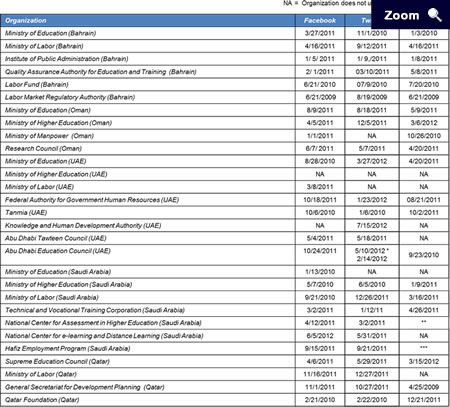Public Sector
Social Sector
Corporate Responsibility
Service Areas
Strategy and Planning
Program Development and Implementation
Organizational Effectiveness
Performance Management and Evaluation
Partnership Services
Business Process Outsourcing
Specializations
Education and National Skills Systems
Entrepreneurship
Cultural Development
Corporate Responsibility
Our Thinking
Research & Insights
An Arab Open Government Maturity Model for Social Media EngagementWes Schwalje, Chief Operating Officer, Doha, Qatar
Walid Aradi, Chief Executive Officer, Dubai, UAE
 |
|
Exhibit: Social Media Account Establishment Dates for Arab Public Sector Institutions in the Education and Employment Sector in the Gulf Countries
Executive Summary
While embrace of social media as a component of open government initiatives is still in its infancy in the Arab World, there is much expectation that public sector social media use will have a transformative impact on citizen participation in government, policy formation, and the way public sector entities conduct business. However, existing evolutionary models of e-government and open government maturity based on the experiences of Western democracies offer little support to Arab entities that operate in an institutional environment characterized by much different governance traditions.
This study develops a social media maturity model which views public sector social media adoption as an evolutionary process that may involve substantial organizational changes for Arab institutions to move from initial stages of social media adoption to more advanced stages of social media use that truly reflect transparency, public participation, and collaboration. We find that current social media use by Arab government entities is focused primarily on one-way government to citizen communications that chronicle the activities of entities rather than offering additional public transparency and opportunities for citizen participation and collaboration.
Arab open government initiatives remain focused on providing information on low priority activities which is already available via traditional media and on institutional websites. In this way, rather than being a force for reform, social media use in open government initiatives has perpetuated existing patterns of opacity, centralized decision making, and paternalism.
A review of several institutions in the Gulf region in the education and employment sector shown in the Exhibit below reflects widespread adoption particularly of Facebook, Twitter, and YouTube and to a limited extent LinkedIn and blogging by Arab public sector institutions. While it is difficult to draw a causal link between the timing of account openings and political events that unfolded as part of the Arab Spring or simply the rise of social media users regionally, the majority of Arab public sector social media accounts were opened in mid-2010 and throughout 2011.

Read More of our Research & Insights












